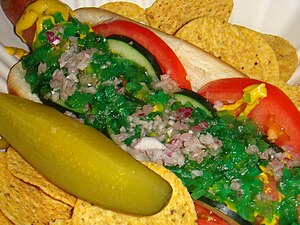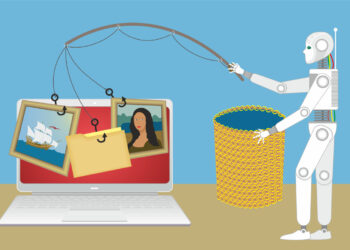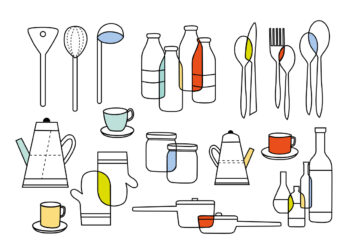
- Image via Wikipedia
Sitting in the audience awaiting the start of the first Oxford-style debate to be held at a PSP meeting (“Current US Copyright Law Excessively Restrains the Development of Intellectual Property“), Michael Clarke and I joked about how Oxford has debates while Chicago has hot dogs and elections (Chicago-style hot dogs have more vegetables and the distinctive taste of celery salt, while Chicago-style elections are notorious for the dead rising from their graves long enough to mark a ballot before mysteriously returning to the moldering ground).
Moderated by Silverchair’s Thane Kerner, the panel included Lawrence Lessig, William S. Strong, Richard Baraniuk, and Allan Adler. The audience was able to vote using a cool text-message polling system that displayed live results as the debate was conducted.
The rules governing an Oxford-style debate are almost as complicated as the ingredients list for a Chicago-style hot dog.
Richard Baraniuk started FOR the proposition, arguing that copyright holds us back because it is inefficient for knowledge exchange, and the inefficiency scales as the value of concatenations of content grow in complexity. In contrast, open licenses let value scale independently, eliminating inefficiency (at least that generated by having to secure legal permissions). In a networked world, these inefficiencies become more glaring. He also disputed the fact that copyright helps authors monetize content. As an author himself, Baraniuk said that authors don’t usually make money, especially academic authors. So authors have no real economic interest in copyright. In fact, it disincentivizes authors because it caps distribution and impact.
Bill Strong then responded AGAINST the proposition, but did not use slides. I initially thought this set him at a clear disadvantage, but it actually seemed to work in his favor. He made a number of points about the importance of copyright in an age of increasing government power — essentially, when government becomes more powerful, the protections for speech must remain so that communication vehicles can become more powerful as an offset. Strong noted that the incentives of scholars are different than more commercial parts of the copyright industry do, so Baraniuk’s perspective is inadequate. Strong asserted that tailoring the copyright law to suit particular types of material is a slippery slope to tyranny. He also noted that our publishing industry is the strongest in the world, and believes copyright is a main reason for this. While potentially imperfect for every scholarly application, tinkering with it could lead to untoward and dangerous consequences.
Strong also drew a distinction between the incentives to create and publish a work and the motivations to repurpose it. Copyright plays a role in both, and provides authors with an infrastructure for publishing by its very existence (how it enables a publishing environment, for instance), and safety in knowing they can know how their works will be reused.
Lawrence Lessig then took the stage, and called Barandiuk a Communist Texan, throwing him under the bus. I can’t capture the energy of his talk, but it centered around the word “excessively,” since he fundamentally agrees with the premise without the word “excessive.” Therefore, the argument is a relative argument, not an absolute argument. His examples were about the excessive complexity of tracking down copyright (75% of works can’t be tracked down for copyright), and the system’s complexity was his complaint. This over-regulation chills exchange of information because the regulation is implemented so poorly. Since copyright predicates itself on a “copy,” and everything digital makes a copy, the framework is wrong, and this is what’s driving the “excessive” restraint.
Allan Adler then took the stage, and took up the “efficiency” gauntlet, and talked about how the Constitution was designed to be inefficient since efficiency was equated with tyranny to them. He then wondered at whether this is harm that can be demonstrated by the excessive restraint introduced by copyright. If no harm, it’s not excessive. Is it the public? The culture? Scholarship? Is it the loss of availability of opportunity (so, an opportunity cost)? Is it creativity that suffers? Adler then reflected on the history of copyright law, which has never created a fair and open playing field. Yet absent a “lost Camelot of copyright law,” how was this balance before the current age achieved and how can it be restored? Ah, but it never existed. Adler points to evidence that refutes the assertion — namely, look at how many new works, how many new devices, how many new businesses, and how many creative ideas are emerging right in front of our eyes. How can this be “restraint”? How do we establish “acceptable” restraint (pointing to Lessig’s argument)? Would the process be any different than the one that led to current legislation? Safeguards in current copyright prevent it from being excessive. For instance, creativity (even a “scintilla of creativity”) can distinguish a work from another. Commonplace ideas aren’t protected. Characters are only protected when they are carefully delineated characters, not stock characters.
Kerner then moved the panel to an interrogatory period, asking Lessig and Baraniuk if their concept of copyright was to create very granular carve-outs. Baraniuk struggled to answer the question. Guided into an answer a little, he reflected on the fact that copyright is too complex. Lessig jumped in, and argued that the business model of mass media is what’s supported by current copyright law. Therefore, yes, more carve-outs would need to exist to manage the complexity, which Kerner rightly pointed out sounded like more complexity, not less.
Strong talked about how non-intuitive copyright law can be, and how education can help. But complexity is not incoherency, Adler added. He then talked about what copyright doesn’t protect — data, concepts, ideas. And because any law streaming from the Federal jurisdiction is complex, the complexity of copyright law isn’t unique. It occurred to me that free speech law is also complex.
Lessig responded that while you can write this off as educational gaps or the like, the fact is that overly complex systems cry out for us to do better. He believes we can do better. What we have is “unbelievably corrosive” to how our culture works, Lessig asserted passionately, stating we should simplify it so it doesn’t “criminalize our kids.”
Strong’s closing comments centered on a lack of empirical evidence that creativity is being stifled, a point Adler made as well.
Baraniuk commented on the millions of works published using Creative Commons as evidence that there’s dissatisfaction with copyright law. He also noted that licenses aren’t incompatible with business.
Adler mentioned how arbitrage financing, investment banking, or other areas of endeavor are complex. Complexity comes with the territory there, and it does with copyright. He then rattled off a litany of increases in output of new titles in movies, music, books, and other media. In 2009, the National Arts Index that measures “the vitality of the arts” in our culture. The latest index listed expansions on all fronts — artists, art businesses, photographers, etc. — up about 19%.
Lessig then closed with the example of how documentary films are essentially shut out of being burned to DVD because getting rights to earlier works is too expensive and complex. To him, this is just more evidence of copyright law being “excessive,” and we should find a way to make it work better.
So, how did the audience end up voting?
51% agreed with the premise — copyright law is an excessive restraint (18% agreed to start)
41% disagreed with the premise (50% disagreed to start)
8% were undecided (32% were undecided to start)
And, no, it wasn’t a Chicago-style election — the voting system prevented you from voting twice. Despite that, I’m convinced an undeclared number craved celery salt.
Discussion
2 Thoughts on "An Oxford-style Debate at PSP 2010: A Chicago-style Hot Dog and Copyright Law"



